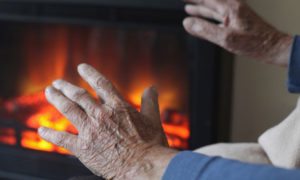 Great Care knows the importance in our seniors and caregivers staying safe in cold weather.
Great Care knows the importance in our seniors and caregivers staying safe in cold weather.
According to the National Institute on Aging (NIA) at the National Institutes of Health, older adults are especially vulnerable to hypothermia because their body’s response to cold can be diminished by underlying medical conditions such as diabetes, some medicines including over-the-counter cold remedies, and aging itself.
“The cold truth about hypothermia is that Americans aged 65 years and older face this danger every winter,” says the NIA. “When the temperature gets too cold or the body’s heat production decreases, hypothermia occurs. Hypothermia is defined as having a core body temperature below 95 degrees, and can develop in older adults after even relatively mild exposure to cold weather or a small drop in temperature.”
The NIA warns that someone suffering from hypothermia may show one or more of the following signs: slowed or slurred speech, sleepiness or confusion, shivering or stiffness in the arms and legs, poor control over body movements or slow reactions, or a weak pulse.
If you suspect hypothermia, or if you observe these symptoms, call 911.
These tips from the NIA help older people avoid hypothermia:
1. When going outside in the cold, it is important to wear a hat, scarf, and gloves or mittens to prevent loss of body heat through your head and hands. Also consider letting someone know you’re going outdoors and carry a fully charged cellphone. A hat is particularly important because a large portion of body heat can be lost through the head. Wear several layers of loose clothing to help trap warm air between the layers.
2. Check with your doctor to see if any prescription or over-the-counter medications you are taking may increase your risk for hypothermia.
3. Make sure your home is warm enough. Some experts suggest that, for older people, the temperature be set to at least 68 degrees.
4. To stay warm at home, wear long underwear under your clothes, along with socks and slippers. Use a blanket or afghan to keep your legs and shoulders warm and wear a hat or cap indoors.
The U.S. Department of Health and Human Services has funds to help low-income families pay heating bills through the Low-Income Home Energy Assistance Program (LIHEAP). Applicants can call the National Energy Assistance Referral (NEAR) project at: 1-866-674-6327, e-mail energy@ncat.org or go to the LIHEAP website http://www.acf.hhs.gov/programs/ocs/resource/liheap-brochures. NEAR is a free service providing information on where you can apply for help through LIHEAP. The Administration for Children and Families funds the Energy Assistance Referral hotline.
The NIA has free information about hypothermia, including the brochure Stay Safe in Cold Weather, the fact sheet Hypothermia: A Cold Weather Hazard, and a fact sheet in Spanish La hipotermia: un peligro del clima frío. You can read these and other free publications on healthy aging on the NIA website at www.nia.nih.gov or order free copies by calling NIA’s toll-free number: 1-800-222-2225.
For more information about NIH and its programs, visit www.nih.gov.
The professionals at Great Care are available to talk with you and your family about all of your home care needs, including respite care. Great Care is a non medical in-home care agency providing quality and affordable elder care in Fishers, IN and the surrounding areas. Call (888) 240-9101 for more information.
Follow Us!